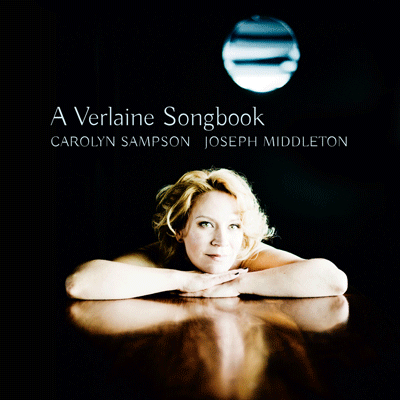Today, singers and their pianists are often more willing also to explore
repertory by composers who are much less well known. Furthermore, a CD can carry much
more music than the typical LP. Carolyn Sampson—an established light
soprano—here offers an entire, well-stocked disc of Verlaine settings by no
fewer than ten composers: the inevitable (but always welcome!) Debussy and
Fauré, but also Saint-Saëns, Chausson, Ravel, Reynaldo Hahn, Charles Bordes,
Déodat de Séverac, Joseph Szulc, and Régine Wieniawski Poldowski (daughter of
the famous violinist).
This does not produce a scattershot effect because several cycles or sets
are recorded entire (Debussy’s Fêtes galantes, series 1, and
Ariettes oubliées; and Fauré’s La bonne chanson). Also, the
songs of Poldowski are grouped together, as are those of Hahn. The single songs
by Ravel, Szulc, et al., thus come as refreshment after a group of tracks by
one composer.
Another element of coherence: a number of the songs use the same text as
some other song on the disc. There is much fascination in observing how
Saint-Saëns, for example, fills “C’est l’extase langoureuse” with a lively
accompaniment emphasizing ecstasy whereas Debussy’s setting emphasizes languor.
And, for extra fun, certain images recur from poem to poem, in different
contexts: moonlight, nightingale, musical note-names (“do-mi-sol”), and so
on.
Roger Nichols’s booklet-essay gives much insight into the different
composers’ approaches to each poem. The translations, by William Jewson, of the
often-laconic song texts are as clear as can be without adding many words of
explanation.
People who already know the Debussy and Fauré songs recorded here may well
be delighted, as I was, to discover how responsive the other composers were to
this poet’s evocative verses. Hahn, Poldowski, Séverac, and Szulc produce what
are, in many ways, quite conservative settings. (Szulc would go on to write
musical comedies.) But conservative need not mean routine. Szulc’s setting of
“Clair de lune” captures the dreamy mood of the text beautifully, as does
Poldowski’s somewhat Schumannesque “En sourdine” (“Calmes dans le demi-jour”).
Poldowski’s “Mandoline” (“Les donneurs de sérénades”) evokes the atmosphere of
commedia dell’arte no less effectively than do the famous settings by
Fauré and Debussy. And there are poetically apt echoes of church style in a
song by Bordes and the closing number of the disc, by Séverac. As for the
master composers, I will confine myself here to mentioning the sole Ravel song:
“Sur l’herbe,” which I had never encountered before, is a wonderful “slice of
life” song in his magical pseudo-Spanish style.
This was my first time hearing Sampson. She is a light, flexible soprano, a
bit like Sylvia McNair or Kathleen Battle. She commands a wide range of
techniques, from straight tone to rich vibrato, and from super-legato singing
and controlled portamento to a semi-spoken lightness. She can file her voice
down to a slender but well-supported thread. Some of the singing is among the
most beautiful that my ears have ever been privileged to receive: for example,
in Chausson’s
“Apaisement” (“La lune blanche”)—which is one of several tracks from the CD
that can be heard on YouTube —and Hahn’s “L’heure exquise” (“Votre âme est un paysage choisi”).
Sampson receives superb support from Joseph Middleton, who is director of
the Leeds Lieder Festival and a professor at the Royal Academy of Music. I was
often enchanted by the ways in which the pianist responds to the changing
imagery in the texts and to shifts in harmony and figuration.
The same performers’ previous CD for BIS, Fleurs (likewise
including some songs by “lesser” composers), was rapturously received by record
critics (including Erin Heisel, in American Record Guide,
September/October 2015). I foresee a similarly positive response to this
marvelously well thought-out CD, which nicely reminds us that many lesser-known
composers from the past have written at least a few pieces that can gratify
performers and listeners alike today.
Warning: at first I listened to some tracks from this Verlaine disc on the
CD player in my car. Sampson's loud high notes often came across as harsh; the echo,
annoying. I wonder if this was a side-product of it being a compatible SACD
disc. (This is the first SACD disc I have tried listening to.) At home, on good
equipment, the whole disc is as exquisite as (Verlaine might say) the glow of
moonlight on russet grass.
Ralph P. Locke
The above review is a lightly revised version of one that first appeared in
American Record
Guide and appears here by kind permission.
Ralph P.
Locke is emeritus professor of musicology at the University of Rochester’s
Eastman School of Music. Six of his articles have won the ASCAP-Deems Taylor
Award for excellence in writing about music. His most recent two books are
Musical
Exoticism: Images and Reflections and
Music and the Exotic from the Renaissance to Mozart (both
Cambridge University Press). The first is now available in paperback, and the
second soon will be (and is also available as an e-book).
